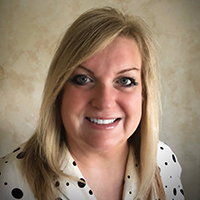 The industry event anyone in secured finance attends now celebrates its 77th year. SFNet is set to make the Arizona convention a memorable one. Click below to register.
The industry event anyone in secured finance attends now celebrates its 77th year. SFNet is set to make the Arizona convention a memorable one. Click below to register.

Karen Pilarz
Senior Vice President, Huntington Business Credit
Karen Pilarz, senior vice president, manages the collateral analyst and field exam teams for Huntington Business Credit, the Asset Based Lending group for The Huntington National Bank. Karen joined Huntington via the acquisition of FirstMerit Bank in August 2016, where she held the same position.
Throughout her career Karen has been an integral part of many acquisition integrations as well as system upgrades and conversions. Karen has developed training programs for both collateral analysts as well as field examiners and is responsible for Huntington Business Credit’s Intern program. For many years, Karen was an instructor for the Secured Finance Network’s Collateral Control Workshop.
Karen has over 25 years of experience in asset-based lending and has spent most of her career in a senior management role. Karen began her ABL career as a field examiner at United Jersey Bank and has held various roles in both Field Exam and Portfolio Management. Karen holds an MBA from Fairleigh Dickenson University and a BS from Bryant University.
What advice would you offer to women just starting out in the industry?
My advice would be the same to women, or anyone, entering the industry: Don’t be afraid to ask questions. Learn from your peers and colleagues. Find someone that can teach you the business. Push yourself out of your comfort zone and accept new challenges. Build your network by developing relationships with colleagues, clients and industry peers. Find a mentor, someone who can guide you in your career, whose opinion you trust, and in whom you can confide.
What role has mentoring played in your career?
Throughout my career I have had people I could turn to for advice. I now try to do the same for others. I enjoy training and mentoring people new to the industry and helping them understand concepts or calculations. I have worked over the years to develop training programs for new collateral analysts and field examiners as well as work with our ABL interns each year.
What do you enjoy most about your role? Least?
The thing that I like most about my job is the people with whom I work. I have been fortunate in my career that I have stayed with the core group of coworkers for the last 20-plus years through various institutions. We work hard and have been successful together and I trust and respect them. Over the years we have built an ABL group with a national presence, a strong portfolio and a diverse team of seasoned employees.
In addition, I can honestly say that I enjoy what I do. My job is rarely boring and there is always something new to learn, a challenge to overcome or a problem to solve.
Least? Meetings that should have just been an email!
How do you balance work/personal time?
This has become a bigger struggle now that we are all remote since my home is now my office. You have to make a concerted effort to shut it down like you are leaving the office. I work for an organization that promotes a work/life balance and provides the resources to promote a better lifestyle.
What do you think work will look like in the post-pandemic world?
The pandemic has proven that we can work remotely and still be successful. I think this is going to change our office habits - going forward we are going to have much more flexibility and not be tied to going to an office every day. I still think going to an office occasionally is nice for team camaraderie and collaboration with coworkers. Teams and Zoom are nice, but there is something to be said for in-person contact.
What effect, if any, has working remotely had on your career and/or your industry? What have been the challenges and how have you worked to overcome them?
We, as an organization, pivoted to working remotely very seamlessly. Our IT organization did a fantastic job supporting this new environment and, believe it or not, a pandemic response was part of our disaster recovery plan, so we were in good shape.
One of the challenges we faced is doing field exams remotely while maintaining the quality of the work. The first few months were scary, and no one knew what to expect but, as time went on and protocols were developed, our field examiners did slowly start going back to customers for some limited work.
77th Annual Convention
 The industry event anyone in secured finance attends now celebrates its 77th year. SFNet is set to make the Arizona convention a memorable one. Click below to register.
The industry event anyone in secured finance attends now celebrates its 77th year. SFNet is set to make the Arizona convention a memorable one. Click below to register.
